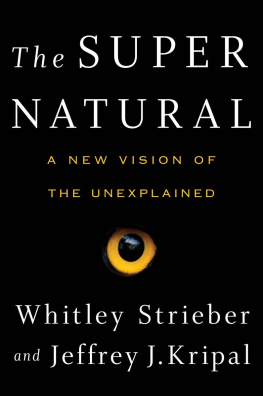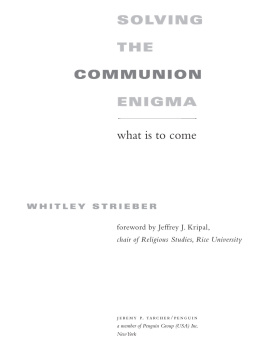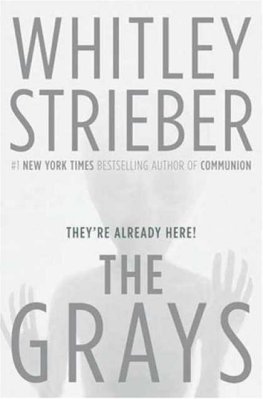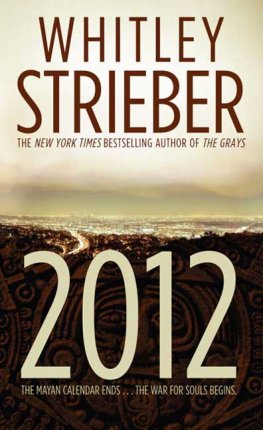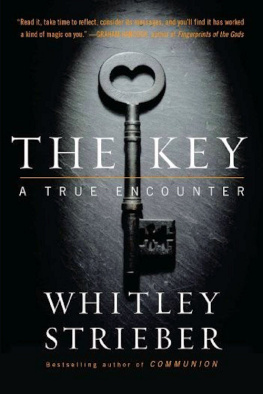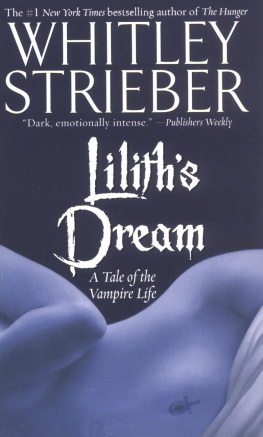Whitley Strieber - Last Vampire
Here you can read online Whitley Strieber - Last Vampire full text of the book (entire story) in english for free. Download pdf and epub, get meaning, cover and reviews about this ebook. year: 2001, publisher: Pocket Books, genre: Prose. Description of the work, (preface) as well as reviews are available. Best literature library LitArk.com created for fans of good reading and offers a wide selection of genres:
Romance novel
Science fiction
Adventure
Detective
Science
History
Home and family
Prose
Art
Politics
Computer
Non-fiction
Religion
Business
Children
Humor
Choose a favorite category and find really read worthwhile books. Enjoy immersion in the world of imagination, feel the emotions of the characters or learn something new for yourself, make an fascinating discovery.
- Book:Last Vampire
- Author:
- Publisher:Pocket Books
- Genre:
- Year:2001
- Rating:4 / 5
- Favourites:Add to favourites
- Your mark:
- 80
- 1
- 2
- 3
- 4
- 5
Last Vampire: summary, description and annotation
We offer to read an annotation, description, summary or preface (depends on what the author of the book "Last Vampire" wrote himself). If you haven't found the necessary information about the book — write in the comments, we will try to find it.
Last Vampire — read online for free the complete book (whole text) full work
Below is the text of the book, divided by pages. System saving the place of the last page read, allows you to conveniently read the book "Last Vampire" online for free, without having to search again every time where you left off. Put a bookmark, and you can go to the page where you finished reading at any time.
Font size:
Interval:
Bookmark:
This book is a work of fiction. Names, characters, places and incidents are products of the authors imagination or are used fictitiously. Any resemblance to actual events or locales or persons living or dead is entirely coincidental.
 POCKET BOOKS, Pocket Books, a division of Simon & Schuster Inc. 1230 Avenue of the Americas, New York, NY 10020
POCKET BOOKS, Pocket Books, a division of Simon & Schuster Inc. 1230 Avenue of the Americas, New York, NY 10020
Visit us on the World Wide Web:
http://www.SimonSays.com
Copyright 2001 by Whitley Strieber
All rights reserved, including the right to reproduce this book or portions thereof in any form whatsoever. For information address Pocket Books, 1230 Avenue of the Americas, New York, NY 10020
ISBN-10: 0-7434-1808-5
ISBN-13: 978-0-7434-1808-9
First Pocket Books hardcover printing August 2001
POCKET and colophon are registered trademarks of Simon & Schuster, Inc.
I would like to acknowledge the help of my editor, Mitchell Ivers; my agent, Sandra Martin; and my wife, Anne Strieber; all of whom have made essential contributions to the creation of this book.
FICTION
The Forbidden Zone
Unholy Fire
Billy
Majestic
Catmagic
The Wild
Natures End
Warday
Wolf of Shadows
The Night Church
Black Magic
The Hunger
The Wolfen
SHORT STORIES (PRIVATE PUBLICATION)
Evenings with Demons: Stories from Thirty Years
NONFICTION
Confirmation
The Secret School
Breakthrough
The Communion Letters
Transformation
Communion
The Coming Global Superstorm
E veryone knew the sins of Miriam Blaylock.
Her crime, and it was an unforgivable one, was to enjoy human beings as friends and lovers, rather than to simply exploit them. She could kiss them and find it sweet, have sex with them and afterward sleep like a contented tiger. To her own kind, this was perversion, like a man with a sheep.
The fact that this prejudice was nonsense did not make what she was doing now any easier. She pressed herself back against the seat of the pedicab, instinctively keeping her face hidden, not only from man, but from her own kind. The samlor moved swiftly down the wet street, spattering through puddles left by the last storm. From the shadows of the passenger compartment, she watched a concealing fog rising from the moat that surrounded the ancient Thai city of Chiang Mai.
How could she ever do this impossible thing? How could she ever face her own kind?
Some theorized that she must have human blood in her family. The idea that there could be interbreeding was absurd, of course nothing but an old husbands tale. She despised the narrowness of her kind, hated what, in recent centuries, their lives had become. They had once been princes, but now they lived behind walls, kept to the shadows, appeared in the human world only to hunt. They had opted out of mans technological society. They knew human breeding, but human technology was simply too intimidating for them.
Miriam owned a thriving nightclub in New York and had bookkeepers and assistants and bartenders, all humans. She had computers to run her accounts. She could access her stock portfolios using her PalmPilot, and she made money on the markets, plenty of it. She had a cell phone and GPS in her car. They didnt even have cars. Once the buggy no longer bounced along behind the horse, they had simply stopped riding. The same with sails. When ships lost their sails, her kind stopped traveling the world. And airplanes well, some of them probably werent yet aware that they existed.
The other rulers of the world were now just shadows hiding in dens, their numbers slowly declining due to accidents. They called themselves the Keepers, but what did that mean nowadays? Gone was the time when they were the secret masters of humankind, keeping man as man keeps cattle.
Truth be told, the Keepers were in general decline, but they were far too proud to realize it. Conclaves were held every hundred years, and at the last ones Miriam had seen a change Keepers she had known a thousand years had followed her mother and father into death. Nobody had brought a child, nobody had courted.
Despite their failure, Miriam valued her kind. She valued herself. The Keepers were essential to the justice and meaning of the world. That was why she had come here, why she had tempted the humiliation and even the possible danger involved: she wanted to continue her species. Miriam wanted a baby.
The last of the four eggs that nature gave a Keeper woman would soon leave her body unless she found a man to fertilize it. For all that she had riches, honor, power, and beauty her essential meaning was unfulfilled without a baby. She was here for her last-chance child.
She gazed across the gleaming back of the samlor driver at the busy night streets of the bustling little city. How the world was changing. She had chosen a samlor out of love for the past, which she most certainly shared with the rest of her kind. She remembered Chiang Mai as a small community of wooden houses with theps carved on the pediments of their soaring, peaked roofs, and golden temple spires rising above lush stands of trees. Now, the narrow old streets resounded with the shrill clatter of tuk-tuks, which were so rapidly replacing the pedal-driven samlor. The traffic wasnt quite yet the hell on earth of Bangkok, but it was certainly going in that direction.
She longed to be home, in her beautiful house, surrounded by her beloved people, faithful Sarah and sweet young Leonore, just now learning her ways.
Just like the black, miserable dens of the other Keepers, her house was full of beautiful things. But hers were treasures of the heart, not the jade and silver and gold pieces her peers collected with total indifference, selling them later just because theyd become antiques among the humans. They didnt enjoy their priceless jade Buddhas or their Rembrandt drawings or their Egyptian gold. They just used them. She had a gold Buddha a thousand years old, before which she meditated, and twin Rembrandts of herself and her beloved mother. He had captured the sure gleam of their essence, she thought. She gazed often at her mothers wide, almost innocent eyes, at the subtle humor in her lips.
Over the millennia, Miriam had lost both parents and her husband. Her keepsakes of them were at the center of her life.
Rembrandt had known that there was something unusual about the two women who had commissioned him, a sense of independence and self-possession that human women in those days did not have. He had captured it in the proud, yet easy stance of the figures he had drawn, humming to himself as he made tiny pen strokes and smoked a long clay pipe. He had kissed Miriams hand and said, You are cold... so cold.
Not only did she enjoy human beings, she took pleasure in human things painting and sculpture, writing and music. She had been an opera buff from the beginning of the genre. She had been at the opening night of a dozen great operas, had been transported by everyone from Adelina Patti to Maria Callas to Kiri Te Kanawa. She remembered the haunting voices of the castrati echoing in the palaces of the Old World.
The other Keepers looked upon humans as animals. Miriam thought that they had souls, that you could feel something leaving their bodies just as they died. It happened while you were all curled up around them, while you were comfortably absorbing their life. A sort of electric charge would seem to come out of them. Only after that would their eyes be totally empty.
They said it was the nervous system shorting out because of the fluid loss. Miriam hoped so. But what if the reality was that men had the souls, not us? If we were the brilliant animals, they the dim angels? That would be an irony, that an animal had created an angel.
Font size:
Interval:
Bookmark:
Similar books «Last Vampire»
Look at similar books to Last Vampire. We have selected literature similar in name and meaning in the hope of providing readers with more options to find new, interesting, not yet read works.
Discussion, reviews of the book Last Vampire and just readers' own opinions. Leave your comments, write what you think about the work, its meaning or the main characters. Specify what exactly you liked and what you didn't like, and why you think so.


